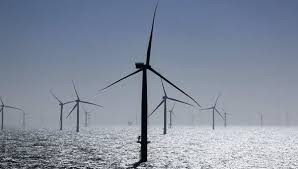To reduce the risks associated with climate change and transform the Mediterranean region into a hub for renewable energy, officials from nine nations that make up the southern European Union announced on Monday that they are concentrating on utilizing offshore wind and solar energy.
In a joint statement, the ministers of energy for Cyprus, Slovenia, and Malta, the minister of economy for Croatia, and representatives from Greece, Italy, France, Portugal, and Spain stated that they are collaborating to establish cross-border renewable energy projects without imposing unnecessary bureaucracy that might deter investors.
To move on with “informed decision-making and concrete action” on green energy projects, they called for the European Commission to lead a fresh research on the region’s renewable energy potential.
The declaration was made in Larnaca during the MED9 Energy Ministerial Meeting.
The host country of Cyprus’s energy minister, George Papanastasiou, said reporters that the “MED9” countries are exploring methods of producing green energy from offshore platforms due to the Mediterranean region’s increasing lack of available land for such projects.
Some governments have already started offshore wind energy pilot projects in shallow waters, according to Papanastasiou.
Other MED9 countries will examine these projects’ outcomes to customize their own infrastructure.
Because southern Europe has more sunlight and therefore more capacity for these technologies, plans are also in place for wave-generated electricity and floating photovoltaic systems.
Laptops 1000Since Mediterranean nations are the most vulnerable to climate change, they “can and must be at the forefront of the energy transition,” according to Joan Groizard, director general of Spain’s Energy Agency.
Connecting offshore wind and solar energy projects to the onshore power grids and interconnections to send energy to other nations is a major obstacle to their utilization.
The Aegean boasts some of the highest wind generation capacities in the EU, according to Greece’s ambassador to Cyprus, Ioannis Papameletiou, who also noted that there is “great room for cooperation and exchange of best practices.”
According to him, Greece aims to include two gigawatts of wind energy in its energy mix by 2030, increasing that amount to ten GW by 2040 and seventeen GW by 2050.
Federica Ferrari Bravo, Italy’s ambassador to Cyprus, stated: “Affordable green energy is also a powerful tool for peace.”

















